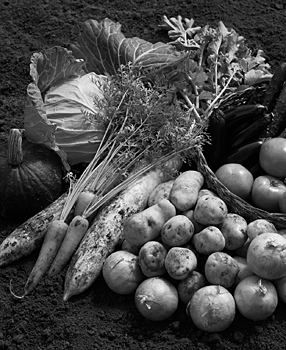SUMMER 2010 CONTENTS
Home
Transformers
How teaching hospitals could lead medicine’s metamorphosis
No holes barred
Interest grows in using natural openings for surgery
The healing hand
Putting the physical back in the physical exam
Take the tube
Mass transit for lab samples
Code green
New hospitals blend healing and conservation
On the record
The nation’s health information technology leader on the future of patient data

DOWNLOAD PRINTABLE
ISSUE (PDF)


In brief
Meat: the enemy
A leading biochemist turns eco-warrior
Photo by AmanaimagesRF
Pat Brown hates animals. On your plate, that is. And he’s going to do something about it.
The biochemist at Stanford’s School of Medicine is taking a yearlong sabbatical — starting now — to figure out how to get you, me and, yes, even the rest of the world to stop bolting down hamburgers, chicken and ribs, and turn instead to beans, carrots and avocados. Why? The environmental cost of meat is just too high.
“People are sort of in denial about whether this is even an issue,” says Brown, MD, PhD, a professor of biochemistry and a Howard Hughes Medical Institute investigator. “But eating one 4-ounce hamburger is equivalent to leaving your bathroom faucet running 24 hours a day for a week. We can’t go on like this.” (See a 2006 report by the Food and Agriculture Organization of the United Nations for this and other shocking statistics.)
Brown, who is also a member of the Institute of Medicine and the National Academy of Sciences, has been a vegetarian for decades and a vegan for five years. He doesn’t want to outlaw eating animal products, but he does want us to begin paying for their true cost. Cows, for example, excrete methane and nitrous oxide, which contribute to global warming, and gobble down tons of water-sucking grains and plants, exacerbating water shortages facing millions around the world.
“Thirty percent of the world’s land is devoted to animal farming,” says Brown. “People need to begin taking responsibility for their food choices. If they can’t do it voluntarily, then we can use economic incentives.” Incentives that include increasing the price of meat at the supermarket counter so it costs two to three times what you’re paying now.
The attempt to change the world’s eating habits seems quixotic, until you consider Brown’s track record. In the early ’90s, he invented the DNA microarray — a method of scanning the activity levels of tens of thousands of genes simultaneously — that’s since become a workhorse in laboratories around the world. And three years ago he conceived of and launched an entirely new type of scientific journal: one in which every article is publicly available, immediately. The publishing industry scoffed but now the Public Library of Science series of journals is one of the most highly respected in the world.
“Scientists are more inclined to do this sort of thing than most people, because we tend to be almost absurdly optimistic,” says Brown. “We believe that things kind of outside the box may still work.”
As for facing the wrath of the meat lovers? Brown’s not fazed.
“I like angry people. If people aren’t angry, I’m not doing my job.”— Krista Conger

